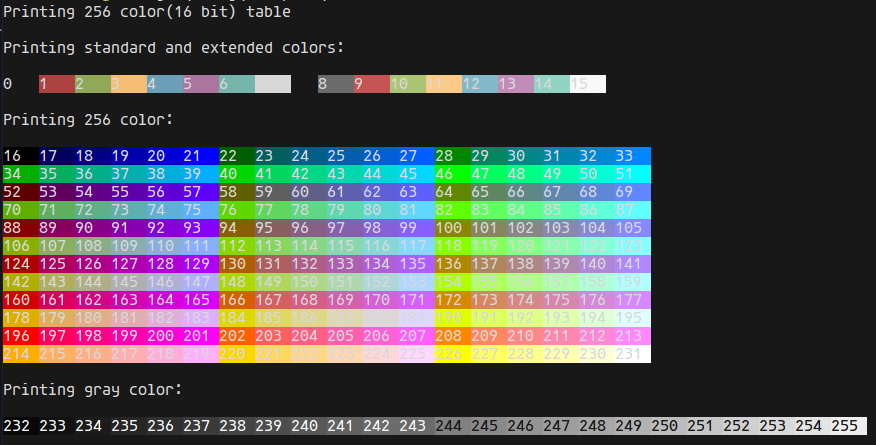6 releases
| 0.2.0 | Jan 21, 2024 |
|---|---|
| 0.1.6 | Jan 11, 2024 |
#911 in Development tools
210KB
527 lines
AnsiStream
Write blazingly fast, free allocation ansi escape codes to a buffer, and flushes them all to any output stream. Supports 8/16 colors, 256 colors, RGB color rendering output.
ANSI Escape Codes for Terminal Graphics
The ANSI escape code standard, formally adopted as ISO/IEC 6429, defines a series of control sequences. Each control sequence begins with a Control Sequence Introducer (CSI), defined as a scape character followed immediately by a bracket: ESC[. In particular, a CSI followed by a certain number of "parameter bytes" (ASCII 0-9:; <=>?) then the letter m forms a control sequence known as Select Graphic Rendition (SGR). If no parameter bytes are explicitly given, then it is assumed to be 0. SGR parameters can be chained together with a semicolon ; as delimiter.
Some common SGR parameters are shown below.
| Parameter | Effect |
|---|---|
| 0 | reset all SGR effects to their default |
| 1 | bold or increased intensity |
| 2 | faint or decreased insensity |
| 4 | singly underlined |
| 5 | slow blink |
| 30-37 | foreground color (3/4 bit) |
| 38;5;x | foreground color (256 colors, non-standard) |
| 38;2;r;g;b | foreground color (RGB, non-standard) |
| 40-47 | background color (8 colors) |
| 48;5;x | background color (256 colors, non-standard) |
| 48;2;r;g;b | background color (RGB, non-standard) |
| 90-97 | bright foreground color (non-standard) |
| 100-107 | bright background color (non-standard) |
- Below example will print a red underlined text.

Usage
- Add the AnsiStream crate to your Cargo.toml
$ cargo add ansistream
- Initialize a buffer and write a simple string in it
// initialize a ansi stream
let output = Cursor::new(Vec::<u8>::new());
let mut astream = ansistream::AnsiScapeStream::new(output);
// write a simple string in buffer
astream.write_string("the quick brown fox jumps over the lazy dog")?;
// data will be flushed when astream drop or gets flushed
- Write the stream in stdout
let stdout = io::stdout().lock();
let mut astream = ansistream::AnsiScapeStream::new(stdout);
astream.write_string("simple text")?;
astream.flush()?;
- Writing a green foreground text to stream
let mut astream = AnsiEscapeStream::new(writer);
astream.write_text_fc_fmt(FCGREEN, format_args!("123")).unwrap();
// asserts that fcgreen was writed and also reseted with fcdefault
assert_eq!(
&[0x1b, 0x5b, 0x33, 0x32, 0x6d, 0x31, 0x32, 0x33, 0x1b, 0x5b, 0x33, 0x39, 0x6d],
astream.buffer()
);
- Write formatted color output
let mut astream = AnsiEscapeStream::new(writer);
for i in 100..=107 {
astream.write_text_color_fmt(FC_LIGHT_GRAY, i, format_args!("{i:>5} "))?;
}
Examples
- 16color example

$ hyperfine --warmup 100 '16color'
Benchmark 1: 16color
Time (mean ± σ): 10.9 ms ± 0.4 ms [User: 5.7 ms, System: 9.3 ms]
Range (min … max): 10.3 ms … 12.2 ms 133 runs
- 256color example

$ hyperfine --warmup 100 '256color'
Benchmark 1: 256color
Time (mean ± σ): 11.3 ms ± 0.4 ms [User: 4.9 ms, System: 9.3 ms]
Range (min … max): 10.7 ms … 12.7 ms 130 runs
- truecolor example

$ hyperfine --warmup 100 'truecolor'
Benchmark 1: truecolor
Time (mean ± σ): 11.2 ms ± 0.5 ms [User: 5.4 ms, System: 9.2 ms]
Range (min … max): 10.4 ms … 13.0 ms 131 runs
Status
Escape codes available
| Finnished | Type |
|---|---|
| x | Color and Style Escape Codes |
| Screen and Cursor Escape Codes |